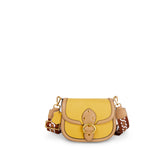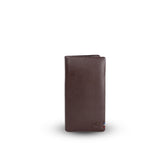How to Choose Between Hard Shell Case and Soft Shell Case
Purchasing new luggage seems so effortless but making the right choice can be challenging. Several options are available, and you don't want to ruin your intended smooth travel just because you've selected a lousy one.
Not sure whether to choose a hard-shell or soft-shell case? Below, we've put together the pros and cons of both to help you choose the luggage that best suits your needs.

Why Choose Hard Shell Case
The Advantages of Hard Cases
-
Hard Exterior and Frame for Protection. If the luggage is dropped or jostled, the hard shell case’s sturdy frame and outer shell give additional protection. This is useful for travel that involves a bumpy ride or air turbulence. Since polycarbonate is stronger and more resistant to cracking than other hard case materials, it is helpful for long-distance travel.
-
Moisture and Stain Resistant. Hard shell case protects your belongings from moisture, so you don’t have to worry about traveling in bad weather. It can easily be cleaned with a cloth when it gets splashed or covered in dirt, unlike other soft case materials like nylon and canvas, which will retain liquid spills and stains.
-
More Colors and Designs are Available. Hard shell cases are available in a variety of hues and designs. Plastic and polycarbonate materials are easy to tint with various colors, allowing designers to produce elegant and creative designs.
The Disadvantages of Hard Cases
-
Less Flexibility. Since hard cases are less flexible than soft cases, it is harder to fit them into tighter spaces, such as airplane overhead bins or the trunk of a car alongside other objects. Also, it reduces the number of items you can fit in the case.
-
Reduced Crack and Scratch Resistance. A hard case has a hard exterior which is more prone to crack when put under pressure or dropped from a cargo hold onto the ground. Unlike the soft case version, the exterior of a hard case is also more likely to have dents and scratches.
-
Fewer Compartments. Hard cases often have one main compartment with one or two smaller pockets hidden inside the interior of the back. This could make it more challenging to contain or arrange your valuables.

Why Choose Soft Shell Case
The Advantages of Soft Cases
-
Increased Flexibility. You can pack as much as possible in a soft case without worrying about fitting your luggage into irregular trunks and small spaces. This can be useful if you’re on a plane and only have a carry-on bag to get it into the overhead or under-seat storage spaces.
-
Scratch and Crack Resistant. Since the exterior surface is fabric, you don’t have to worry about dents or cracks that would appear on a hard case. The soft case is less likely to show the hard knocks and riggers of travel when dropped from a height or crammed into a crowded cargo hold. A soft case will therefore maintain its brand-new look for longer.
-
Lighter Weight Than Hard Cases. Soft cases are lighter and easier to transport the hard cases because they are constructed of thinner materials.
-
More Compartments and Pockets. Extra and front pockets on soft cases make it simpler to organize and access smaller items and paperwork you might need for boarding or during a flight.
The Disadvantages of Soft Cases
-
Weaker Exterior Material. Soft cases, despite being smaller, can still expose delicate objects to risk, particularly if the exterior is made of softer materials. Consider a hard case design if you require additional protection for delicate items.
-
Fewer Color and Design Options. Due to the different quality of fabrics used, soft shell cases tend to have fewer design and color options than hard case shells.
-
Readily Absorbs Water and Smells. The fabric exterior of a soft case is more likely to absorb and hold liquid and smells, and cleaning a spill on your case is more difficult than wiping down a hard case. This can be a particular disadvantage if you are traveling in inclement weather when water can leak into the case and damage your belongings.
Bottom Line
In the end, how you travel, what you carry, and your personal preferences should determine your decision to use hard-shell or soft-shell luggage. Both hard and soft shell luggage are incredibly functional and will serve the purpose for which you bought them. Because of this, the best thing you can do is to jot down your wants and needs before investing in high-quality luggage.






